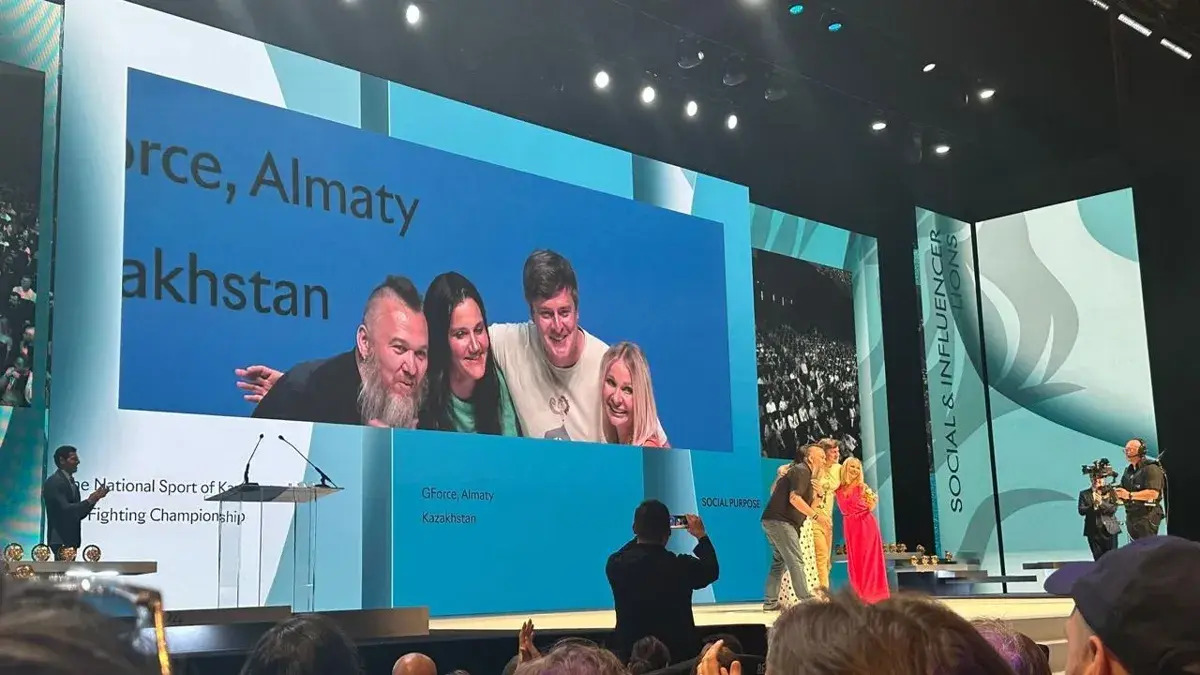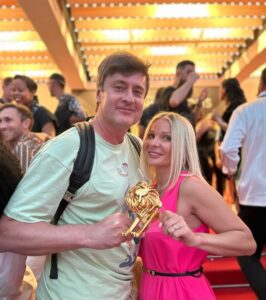ASTANA—The Kazakh advertising agency GForce Grey achieved a significant milestone by winning a Golden Lion at the Cannes Lions International Festival held from June 17-21. This festival is the most prestigious global competition for advertising professionals, with awards across various categories, such as traditional media, digital technologies, PR, design, and creative effects.

GForce Grey company receives awards at the Cannes Lions International Festival. Photo credit: Levan Lepsveridze
GForce Grey earned the Golden Lion in the Social and Influencer category for Social Purpose, standing out among 1,763 other projects worldwide. The winning project, which focused on domestic violence, was implemented on Oct. 10, 2023.

Yevgeniy Kostylev, an Executive Creative Director of GForce Grey. Photo credit: Kostylev’s personal archieve
In an interview with The Astana Times, Yevgeniy Kostylev, an executive creative director at GForce Grey, shared the emotional experience of winning the award. He recounted the initial shock and disbelief when he received the email notification of their victory, eventually leading to a moment of jubilation within the agency.
Kostylev highlighted the significance of the festival, describing it as the largest and most prestigious event in the advertising world.
He expressed pride in bringing the first Golden Lion to Kazakhstan, marking a historic achievement for the country’s creative industry.
“We were all embarrassed that Kazakhstan still had not won a single Lion. And now, we have a lion and a golden one. We are very proud that our agency was the first to achieve this. We are the most awarded agency in Kazakhstan and Central Asia, and this pinnacle of success has been a long journey for us,” he said.
The award-winning campaign against domestic violence
The award-winning project involved a collaboration with Ruh Fighting Championship to stage the first-ever fights in Kazakhstan, broadcast live, in which men would face women in the ring.
“When developing the idea, we started from a study that showed only 11% of the signatories of last year’s petition to toughen penalties for domestic violence were men. It was strange that men were ignoring this issue, even though they should be the ones addressing it. The majority of men in Kazakhstan are raised from childhood to believe that ‘a real man should never hit a woman.’ But why do you say nothing when others do it as if it does not concern you?” said Kostylev.

Yevgeniy Kostylev and Yulia Tushina with the Golden Lion Award. Photo credit: Kostylev’s personal archieve
The team at GForce Grey found an innovative way to prompt men to speak out against domestic violence, both literally and figuratively. They brought the issue from behind closed doors into the spotlight by announcing the first male vs. female fight in Kazakhstan at a press conference.
This move sparked a wave of righteous indignation, with hundreds of thousands of negative comments condemning the idea and shaming those who supported it. The public reaction was overwhelmingly against the notion that a man should ever hit a woman.
“At the scheduled time, instead of broadcasting the fight, we aired a video montage featuring real footage of instances where men were seen physically assaulting women, highlighting that such incidents occur at a staggering rate of 100,000 annually in Kazakhstan, according to the Ministry of Internal Affairs,” said Kostylev. “This unexpected move turned many of our critics into allies, prompting them to break their silence on the issue. Notably, 90% of those engaged in the campaign were men. In this way, we contributed to the passage of legislation criminalizing domestic violence.”
He underscored that domestic violence remains a persistent issue, compounded by legislative disagreements and societal norms that dictate women to endure without airing grievances, particularly in conservative and traditionalist circles.
“For several reasons, the adoption of such laws is often viewed as a challenge to traditional family values. It is impossible to change society to zero tolerance for domestic violence overnight. But attitudes can be changed gradually, with a comprehensive set of solutions, starting with the adoption of the law and ending with social support programs for women and social-educational advertising communication,” said Kostylev.
When the project idea was initially announced, it triggered a barrage of negative comments, leading to organizers facing public shaming, boycott calls, and petitions urging cancellation. These actions included tagging governmental authorities and even the president in their protests.
“However, following the broadcast, these detractors transformed into supporters, expressing gratitude for raising awareness and actively endorsing the petition. One notable comment, originally directed at the fight organizers but resonating across all Kazakh men, questioned, ‘Why are you embarrassing yourselves and us?’ While some initially supported the fight and saw no issue with it, their viewpoints were swiftly outnumbered by a flood of comments from other men who overwhelmingly rejected such perspectives,” said Kostylev.
Kostylev credited the pivotal roles played by their client and fight organizer, Ruh Fighting, in executing the campaign.
“Ruh Fighting, which develops sports in our country and organizes mixed martial arts (MMA) tournaments, as well as various campaigns aimed at improving society, not only facilitated the event logistics but also boldly championed our cause through press conferences and social media announcements,” he said.
Another key partner, Kazakhstan’s CITIX IT company, amplified campaign visibility by showcasing fight announcements on city screens.
Commitment to social responsibility
Kostylev emphasized the transformative potential of advertising agencies, noting their ability to influence societal norms and address pressing social issues.
“Agencies should be socially beneficial, giving back to society because it is the society that pays for the products of the advertisers who hire us,” he said.
Kostylev also discussed several social initiatives planned for a prominent global brand aiming to benefit Kazakh society while promoting its products.
“We hope everything goes well. The primary challenge lies not in generating ideas but in executing them at a consistently high-quality level. If everything goes as planned, you will see our new social projects in the fall,” he said.
Highlighting key principles for successful campaigns, Kostylev emphasized the importance of being demanding, critical, and embracing uncertainty.
“It sounds strange, but uncertainty is the engine of progress. Doubting whether the campaign idea, script, or outdoor advertising design is good enough pushes us to keep refining it, striving for continuous improvement. ‘Normal’ is not satisfactory, it must be executed exceptionally well, and then elevated even further. Ultimately, our goal is not merely awards, it is to create work of such excellence that it merits recognition,” he added.
